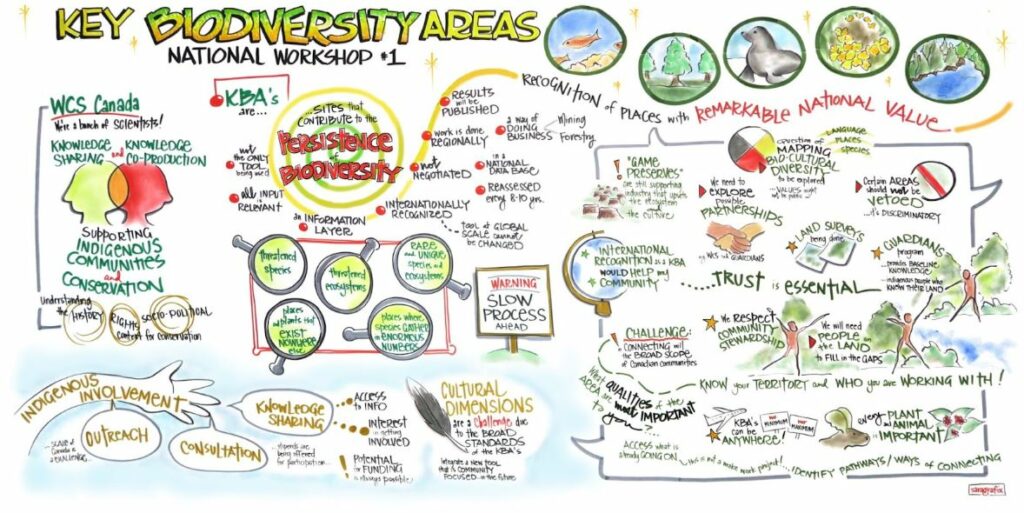The KBA Canada Initiative is committed to respecting and supporting Indigenous values and stewardship efforts. This includes respecting Indigenous Knowledge Systems and Holders as well as enabling meaningful participation and acknowledging Indigenous Peoples roles and responsibilities in taking care of the lands, waters, animals, and plants that the KBA Canada Initiative is focused on. KBA Canada is a broad and open partnership run by non-governmental organizations and supported by knowledge holders and experts across the country (see here for more information on who’s involved).
The KBA Secretariat and Steering Committee, regional coordinators, and staff seek ways to reach out to and support Indigenous Peoples in their engagement with this initiative. We seek to create opportunities to share experiences and knowledge about plants, animals and ecosystems and their stewardship, in the spirit of reciprocal learning. All forms of knowledge, including Traditional Ecological Knowledge (TEK) are appropriate for identifying KBAs, and where it is contributed TEK will not be taken out of context, knowledge holders will be invited to review how the information is used, and TEK will be considered on equal footing with western science information.
While KBAs are based on a global ecological standard that was not co-developed with Indigenous Peoples, we hope that KBAs in Canada will complement and support Indigenous-led conservation and stewardship based on Indigenous values and priorities. The process for implementing the KBA tool, and the resulting information, can be adapted to be as relevant as possible for Indigenous Nations, based on input and feedback offered. In some cases, KBAs may or may not align with biodiversity values of high priority to Indigenous communities, but they are always focused on ensuring that no species or ecosystems are lost from the planet, a goal that all stewards of nature share.
It is important to acknowledge up front that the KBA tool identifies sites important to the global and national persistence of species and ecosystems and does not capture many other values that may be important to Indigenous communities and Nations. Partially, this is because it is a global standard, and values important to communities do not easily translate into criteria that can be assessed at the global or even national scale. While KBAs may or may not align with places that have high value for Indigenous communities, the KBA tool can be used to complement information that prioritizes the values that are most important to Indigenous communities. The sites where KBAs are identified are often already known to Indigenous communities and experts, but by applying the KBA Standard to recognize the sites formally as KBAs, the sites will receive international recognition as places that are especially important for sustaining species and ecosystems. KBA Canada is interested in supporting Indigenous-led conservation as much as possible, and to this end, is asking Indigenous communities and Nations how this work and the resulting information could be useful to them. Some possibilities that have been mentioned to date include:
As potential KBAs are identified across regions, KBA Canada will reach out to engage with Indigenous communities and groups in these regions, including with outreach letters to explain the project at the beginning of regional work and more targeted contact efforts to reach each community that has interest in or a potential association with a KBA. We are interested in sharing knowledge and views about specific places that are important for animals, plants and ecosystems and hearing different perspectives about these places. At any time, we are available to meet with interested communities and groups who wish to learn more about KBAs, suggest a potential KBA, or lead the proposal of an area as a KBA . KBA Canada can offer training on KBA criteria and assessment methods, discussions and honoraria to Indigenous knowledge holders who wish to participate in or lead KBA assessments.
Participation in the KBA Canada Initiative can vary according to the interest and capacity of various communities or Indigenous governments and groups. At a site level, communities and groups can support or co-develop KBA proposals. This might include contributing knowledge about the site or species, advising on the mapping of sites or reviewing the details of the KBA proposal. Timelines for proposals can be flexible to accommodate the needs of interested communities.
At a national or regional level, KBA Canada also welcomes Indigenous advice and perspectives on our operations. If you would be interested in advising our program, please contact us.
We are always available to offer information sessions to communities, groups or councils interested in learning more about KBAs and how they might be used. Please contact us to coordinate this.
Visit our Frequently Asked Questions for more information about how KBAs may be relevant to Indigenous conservation and about opportunities for participation.
Graphic recording of national Indigenous KBA workshop, March 2022.

KBAs represent one of many tools that will be critical for helping to avoid the loss of biodiversity. Within the Canadian conservation landscape, KBAs occupy a space that is complementary to several other approaches and resources, and KBA Canada will try to proactively align with existing conservation and SAR work going on with Indigenous Nations. With this goal in mind, see below for resources related to KBAs and Indigenous-led conservation.
KBAs and Indigenous engagement
Indigenous-led conservation
Reconciliation